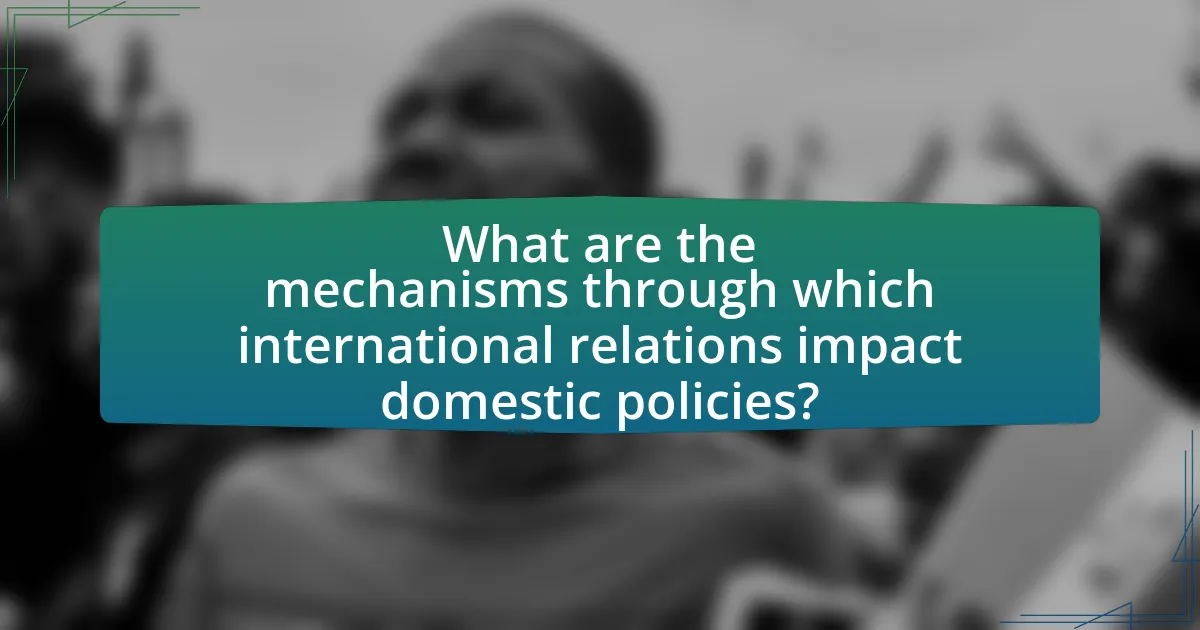The article examines the intricate relationship between international relations and domestic policy decisions, highlighting how global dynamics shape national governance. It discusses key factors such as economic interdependence, security alliances, and international norms that influence domestic policies, using historical and contemporary examples. The impact of global events on political agendas, the role of treaties and international organizations, and the consequences of neglecting international influences are also explored. Additionally, the article emphasizes the importance of understanding these relationships for effective policymaking and outlines strategies for aligning domestic policies with international commitments.

What is the relationship between international relations and domestic policy decisions?
International relations significantly influence domestic policy decisions by shaping the political, economic, and security environment within a country. For instance, trade agreements negotiated internationally can lead to changes in domestic economic policies, such as tariffs and regulations, to align with global standards. Additionally, international security threats often prompt governments to adjust their domestic policies regarding defense spending and law enforcement. Historical examples include the post-World War II Marshall Plan, which not only aimed to rebuild Europe but also influenced U.S. domestic policies by promoting economic growth and stability. Thus, the interconnectedness of international relations and domestic policy is evident in how external factors drive internal decision-making processes.
How do international relations influence national governance?
International relations significantly influence national governance by shaping policy decisions, economic strategies, and security measures. For instance, countries often adjust their domestic policies in response to international treaties, trade agreements, and diplomatic relations. A concrete example is the North American Free Trade Agreement (NAFTA), which led to changes in economic policies in the United States, Canada, and Mexico, impacting labor markets and trade regulations. Additionally, international relations can dictate national security policies, as seen in the post-9/11 era when the U.S. government implemented the Patriot Act to enhance security measures in response to global terrorism threats. These examples illustrate how international dynamics directly affect the governance structures and policy frameworks within nations.
What are the key factors in international relations that affect domestic policies?
Key factors in international relations that affect domestic policies include economic interdependence, security alliances, and international norms. Economic interdependence influences domestic policies through trade agreements and foreign investment, as seen in the North American Free Trade Agreement (NAFTA), which reshaped trade policies in the U.S., Canada, and Mexico. Security alliances, such as NATO, compel member states to align their defense policies with collective security commitments, impacting military spending and foreign policy decisions. Additionally, international norms, such as human rights standards set by organizations like the United Nations, can pressure governments to adopt specific domestic policies to maintain legitimacy and international standing.
How do global events shape domestic political agendas?
Global events significantly shape domestic political agendas by influencing public opinion, policy priorities, and political discourse. For instance, the 2008 financial crisis prompted governments worldwide to adopt economic stimulus measures, reshaping national economic policies and priorities. Additionally, international issues such as climate change have led to increased public demand for environmental policies, compelling domestic leaders to integrate sustainability into their agendas. Historical examples, such as the response to the COVID-19 pandemic, illustrate how global health crises can shift political focus towards healthcare reform and crisis management strategies. These events create a context in which domestic leaders must respond to external pressures, thereby aligning their political agendas with global trends and challenges.
Why is understanding this relationship important for policymakers?
Understanding the relationship between international relations and domestic policy decisions is crucial for policymakers because it directly influences national security, economic stability, and social cohesion. Policymakers must recognize that international events, such as trade agreements or geopolitical conflicts, can have immediate and profound effects on domestic issues like employment rates, inflation, and public sentiment. For instance, the 2008 financial crisis, which was partly triggered by international banking practices, led to significant domestic policy shifts in the United States, including the implementation of the Dodd-Frank Act to regulate financial institutions. This illustrates that a comprehensive understanding of international dynamics enables policymakers to craft informed strategies that mitigate risks and leverage opportunities for their constituents.
What are the potential consequences of neglecting international influences?
Neglecting international influences can lead to significant economic, political, and social consequences for a nation. Economically, countries may face trade imbalances, reduced foreign investment, and loss of competitive advantage in global markets, as evidenced by the decline in exports experienced by nations that isolate themselves, such as North Korea. Politically, a lack of engagement with international partners can result in diminished diplomatic relations, increased isolation, and vulnerability to external pressures, as seen in the sanctions imposed on Iran due to its disregard for international agreements. Socially, neglecting global perspectives can hinder cultural exchange and innovation, limiting a nation’s ability to adapt to global trends and challenges. These consequences illustrate the critical importance of acknowledging and integrating international influences into domestic policy decisions.
How can awareness of international relations improve policy effectiveness?
Awareness of international relations can significantly improve policy effectiveness by enabling policymakers to understand global dynamics and their implications for domestic issues. This understanding allows for the anticipation of international trends, fostering proactive rather than reactive policy measures. For instance, the 2008 financial crisis highlighted how interconnected economies are; countries that recognized these international ties were better equipped to implement effective economic policies that mitigated the crisis’s impact. Additionally, awareness of international relations aids in diplomatic negotiations, as informed policymakers can leverage their knowledge to secure favorable outcomes, as seen in trade agreements like the North American Free Trade Agreement (NAFTA), which was shaped by an understanding of regional economic interdependencies.

What are the mechanisms through which international relations impact domestic policies?
International relations impact domestic policies through mechanisms such as economic interdependence, security alliances, and international norms. Economic interdependence, exemplified by trade agreements like NAFTA, influences domestic economic policies by necessitating regulatory alignment to facilitate trade. Security alliances, such as NATO, compel countries to adjust their defense policies and military spending in response to collective security commitments. Additionally, international norms, established through organizations like the United Nations, shape domestic policies by promoting human rights standards that governments are pressured to adopt. These mechanisms demonstrate the interconnectedness of global and domestic policy frameworks.
How do treaties and agreements shape domestic legislation?
Treaties and agreements significantly influence domestic legislation by establishing legal obligations that countries must adhere to, which often necessitates changes in national laws. For instance, when a country ratifies an international treaty, it typically requires the government to align its domestic laws with the treaty’s provisions, thereby shaping legislative priorities and frameworks. An example is the United Nations Convention on the Rights of the Child, which has prompted numerous countries to amend their laws to enhance child protection measures, demonstrating how international commitments directly impact national legal systems.
What role do international organizations play in influencing domestic policy?
International organizations play a significant role in influencing domestic policy by providing frameworks for cooperation, setting standards, and facilitating dialogue among member states. These organizations, such as the United Nations and the World Trade Organization, often establish guidelines that countries adopt to align with international norms, which can lead to changes in national legislation and policy priorities. For instance, the World Health Organization’s recommendations during health crises can prompt countries to reform their healthcare policies to improve public health responses. Additionally, international organizations can offer financial assistance and technical support, incentivizing domestic policy changes that align with global objectives, such as sustainable development goals.
How do diplomatic relations affect domestic political stability?
Diplomatic relations significantly influence domestic political stability by shaping a country’s international standing and internal cohesion. Strong diplomatic ties can enhance national security, attract foreign investment, and foster economic growth, which in turn can bolster public support for the government. For example, countries with stable diplomatic relations, such as Canada and the United States, often experience lower levels of domestic unrest due to the economic benefits derived from trade agreements and cooperative security arrangements. Conversely, strained diplomatic relations can lead to economic sanctions, isolation, and increased domestic dissent, as seen in nations like Venezuela, where international isolation has exacerbated political instability and social unrest.
What is the impact of economic globalization on domestic policy decisions?
Economic globalization significantly influences domestic policy decisions by compelling governments to adapt their economic strategies to align with global market dynamics. This adaptation often includes deregulation, trade liberalization, and the implementation of policies that attract foreign investment. For instance, countries that engage in economic globalization may prioritize policies that enhance competitiveness, such as tax incentives for multinational corporations, which can lead to shifts in domestic labor laws and social welfare programs. Additionally, empirical evidence shows that nations with higher levels of trade openness tend to experience changes in public policy aimed at fostering innovation and improving infrastructure to meet international standards.
How do trade agreements influence local economies and policies?
Trade agreements significantly influence local economies and policies by altering trade flows, impacting employment, and shaping regulatory standards. These agreements often lead to increased market access for local businesses, which can stimulate economic growth and job creation. For instance, the North American Free Trade Agreement (NAFTA) resulted in a 20% increase in trade between the U.S., Canada, and Mexico, demonstrating how trade agreements can enhance economic activity. Additionally, trade agreements may require local governments to adjust policies to comply with international standards, affecting regulations on labor, environmental protections, and tariffs. The European Union’s single market is a prime example, where member states harmonize regulations to facilitate trade, thereby influencing domestic policy decisions.
What are the implications of foreign investment on domestic regulations?
Foreign investment significantly influences domestic regulations by prompting governments to adapt their policies to attract and retain foreign capital. This adaptation often leads to deregulation in sectors such as labor, environmental standards, and taxation, as countries seek to create a more favorable investment climate. For instance, a study by the International Monetary Fund in 2019 found that countries with higher levels of foreign direct investment tend to lower corporate tax rates to remain competitive. Additionally, foreign investors may lobby for regulatory changes that align with their business interests, further shaping domestic policy. This dynamic can lead to a tension between protecting local interests and accommodating foreign entities, ultimately affecting the regulatory landscape.

What are the specific case studies illustrating the effect of international relations on domestic policies?
Specific case studies illustrating the effect of international relations on domestic policies include the U.S. response to the 9/11 attacks, which led to the implementation of the Patriot Act, significantly altering domestic surveillance policies. Another example is the European Union’s influence on member states’ environmental regulations, where international agreements have prompted countries like Germany to adopt stricter emissions standards. Additionally, the normalization of relations between the U.S. and Cuba in 2014 resulted in changes to domestic policies regarding trade and travel restrictions, reflecting the impact of international diplomacy on internal governance. These cases demonstrate how international relations can directly shape domestic legislative and regulatory frameworks.
How did international relations shape the domestic policies of the United States?
International relations significantly shaped the domestic policies of the United States by influencing legislative priorities, economic strategies, and social reforms. For instance, during the Cold War, the U.S. adopted policies such as the Marshall Plan, which not only aimed to contain communism abroad but also stimulated the domestic economy through increased production and job creation. Additionally, international commitments, such as NATO, led to increased defense spending, which directly impacted domestic budget allocations and economic policies. The 9/11 attacks prompted the U.S. to implement the Patriot Act, altering civil liberties and law enforcement practices domestically in response to perceived international threats. These examples illustrate how external geopolitical dynamics have consistently driven domestic policy decisions in the United States.
What lessons can be learned from the U.S. response to international crises?
The U.S. response to international crises teaches the importance of timely intervention and multilateral cooperation. Historical examples, such as the U.S. involvement in NATO-led operations during the Kosovo War in 1999, demonstrate that swift action can prevent further escalation of conflicts. Additionally, the U.S. response to the Ebola outbreak in West Africa in 2014 highlighted the necessity of global partnerships, as the collaboration with international organizations like the World Health Organization was crucial in controlling the spread of the virus. These instances underscore that effective crisis management often relies on a combination of prompt action and collaborative efforts with other nations and organizations.
How have U.S. foreign policy decisions influenced domestic social issues?
U.S. foreign policy decisions have significantly influenced domestic social issues by shaping public opinion, economic conditions, and civil rights movements. For instance, the Vietnam War led to widespread protests and a counterculture movement in the 1960s and 1970s, which challenged traditional social norms and prompted discussions about civil liberties and government accountability. Additionally, foreign policy decisions, such as the War on Terror, have resulted in increased surveillance and security measures domestically, impacting civil rights and privacy concerns. The economic implications of foreign trade agreements, like NAFTA, have also affected job markets and labor rights, leading to social unrest in affected communities. These examples illustrate how U.S. foreign policy not only dictates international relations but also reverberates through domestic social landscapes, influencing public discourse and policy changes.
What examples can be found in European countries regarding this relationship?
European countries provide several examples of how international relations influence domestic policy decisions. For instance, Germany’s energy policy has been significantly shaped by its commitment to the Paris Agreement, leading to a transition towards renewable energy sources. This shift is evidenced by the Energiewende initiative, which aims to reduce greenhouse gas emissions by 55% by 2030 compared to 1990 levels. Similarly, France’s foreign policy towards Africa has impacted its domestic immigration policies, as seen in the 2019 immigration law that reflects France’s historical ties and responsibilities towards its former colonies. These examples illustrate the direct correlation between international relations and domestic policy frameworks in European nations.
How have EU policies affected member states’ domestic laws?
EU policies have significantly influenced member states’ domestic laws by requiring alignment with EU regulations and directives. For instance, the implementation of the General Data Protection Regulation (GDPR) mandated changes in data protection laws across all member states, ensuring a uniform standard for privacy rights. Additionally, the EU’s Common Agricultural Policy (CAP) has led to modifications in agricultural laws and practices within member states to comply with EU standards and funding mechanisms. These examples illustrate how EU policies necessitate legal adaptations at the national level, reinforcing the interconnectedness of EU governance and domestic legislation.
What role does Brexit play in shaping the domestic policies of the UK?
Brexit significantly influences the domestic policies of the UK by necessitating a re-evaluation of trade, immigration, and regulatory frameworks. The departure from the European Union has led the UK government to establish new trade agreements, such as the UK-Japan Comprehensive Economic Partnership Agreement, which aims to enhance trade relations outside the EU. Additionally, Brexit has prompted changes in immigration policy, as the UK has moved to a points-based system to control the influx of workers, reflecting a shift towards prioritizing skilled labor. Furthermore, the UK has begun to diverge from EU regulations, allowing for more tailored domestic legislation, such as the Environment Act 2021, which sets independent environmental standards. These changes illustrate how Brexit reshapes the UK’s approach to governance and policy-making in response to its new international standing.
What practical strategies can policymakers use to align domestic policies with international relations?
Policymakers can align domestic policies with international relations by implementing comprehensive stakeholder engagement strategies. Engaging various stakeholders, including businesses, civil society, and international partners, ensures that domestic policies reflect global standards and practices. For instance, the European Union’s alignment of its environmental regulations with international agreements like the Paris Accord demonstrates how stakeholder input can shape effective domestic policy that supports international commitments. Additionally, conducting regular policy reviews and assessments can help identify areas where domestic policies may diverge from international obligations, allowing for timely adjustments. This approach not only enhances compliance but also fosters a cohesive strategy that promotes national interests while adhering to global norms.
How can governments effectively communicate international influences to the public?
Governments can effectively communicate international influences to the public by utilizing clear messaging through multiple channels, including social media, press releases, and public forums. This approach ensures that citizens receive timely and accurate information regarding how global events impact domestic policies. For instance, during the COVID-19 pandemic, governments worldwide used daily briefings and social media updates to explain international health guidelines and their implications for local regulations, which helped maintain public trust and compliance. Studies show that transparency in communication fosters a better understanding of complex international issues, leading to increased public engagement and informed citizenry.
What best practices exist for integrating international considerations into domestic policy planning?
Best practices for integrating international considerations into domestic policy planning include conducting comprehensive stakeholder consultations, utilizing data-driven analysis, and aligning domestic policies with international agreements. Stakeholder consultations ensure that diverse perspectives, including those from international experts and local communities, are considered, fostering inclusivity and relevance. Data-driven analysis allows policymakers to assess the potential impacts of international trends on domestic issues, such as trade, security, and environmental challenges. Aligning domestic policies with international agreements, such as the Paris Agreement on climate change, ensures coherence and compliance with global standards, enhancing a country’s credibility and effectiveness in the international arena. These practices are supported by evidence from various countries that have successfully navigated complex international landscapes while addressing domestic priorities.




